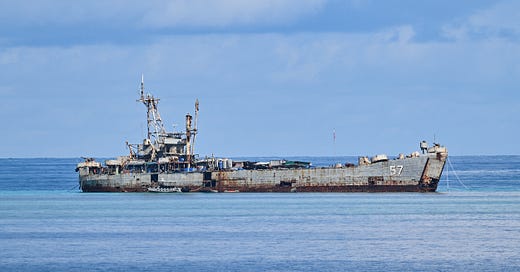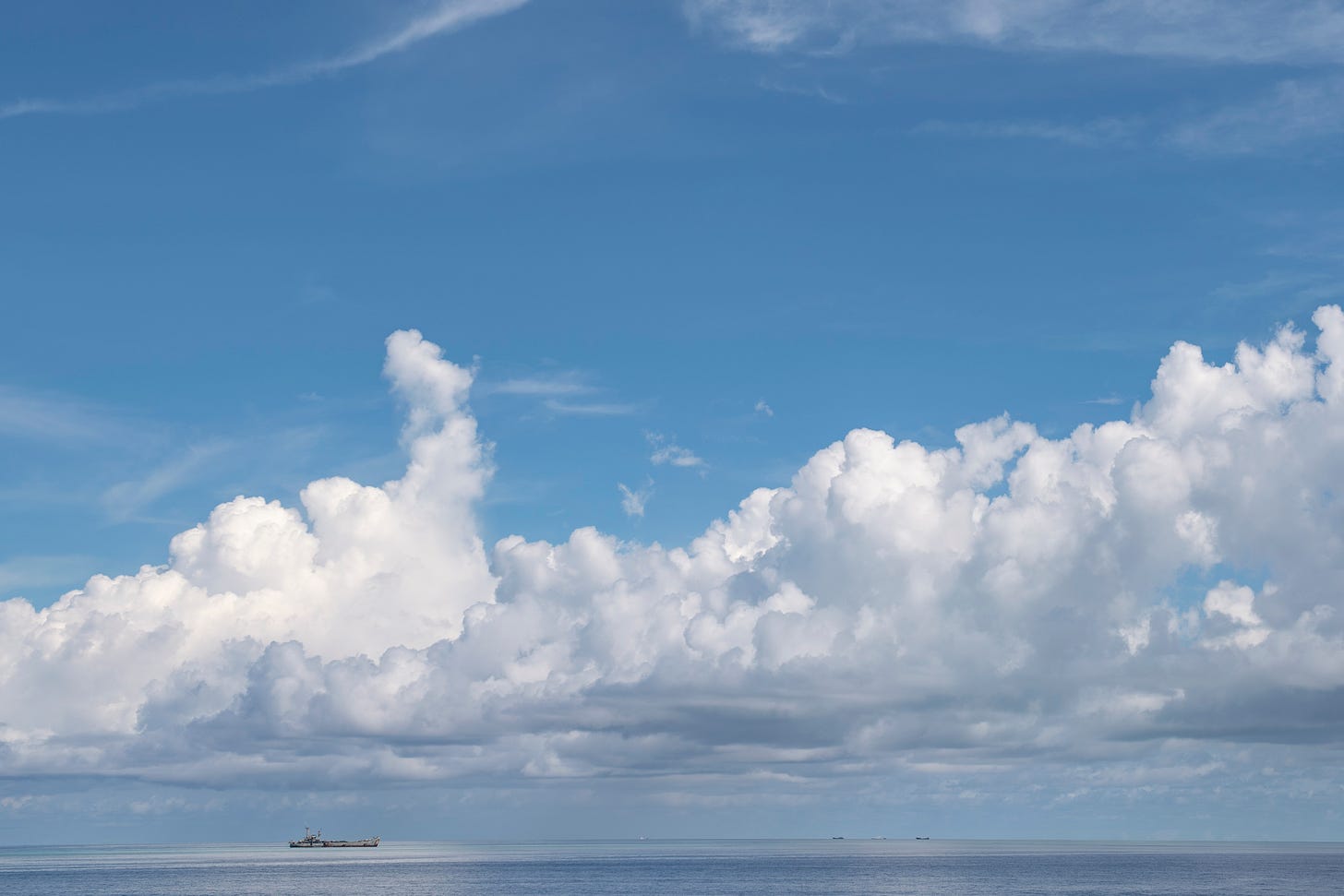China's stance on Ren'ai Jiao remains unchanged despite allowing the Philippines to resupply: views from Chinese experts
"Allowing the Philippines to resupply its grounded military ship at the reef is China's humanitarian attitude, rather than a change of its stance on the issue or a compromise of China's sovereignty."
Good evening. It's encouraging to see that China and the Philippines have recently reached a provisional arrangement for the humanitarian resupply of essential living necessities to Ren'ai Jiao in the South China Sea.
Today's piece includes insights from interviews with Chinese experts, conducted by my colleagues Ren Ke, Ren Yaoti, and Zhao Chenjie, regarding this agreement. The experts highlighted that allowing the Philippines to resupply its grounded military ship at the reef demonstrates China's humanitarian approach, rather than indicating a shift in its position or a compromise on its sovereignty over the reef.
The Philippines conducted a resupply mission of living necessities to its warship grounded on China’s Ren’ai Jiao reef in the South China Sea on Saturday morning, said a spokesperson of the Chinese Foreign Ministry.
The move came after China and the Philippines reached a provisional arrangement in recent days on managing the situation at Ren’ai Jiao. The entire process was monitored by the China Coast Guard.
China, while reaffirming its claim that Ren'ai Jiao is an inherent part of its territory, has consistently demonstrated goodwill and sincerity in addressing the related issues with the Philippines.
The dispute between the two countries stems from the Philippines' deliberate and unlawful grounding of the vessel, BRP Sierra Madre, on Ren'ai Jiao as early as 1999, using "technical failures" as an excuse.
Though the Chinese government immediately expressed its strong objection and demanded the immediate removal of the warship by the Philippines, it failed to fulfill its promise of promptly towing away the vessel even after all these years.
This is the Philippine warship, BRP Sierra Madre that grounded on Ren'ai Jiao in the South China Sea (photo taken on June 29 by Sun Ruibo)
To solve the issue with joint efforts, China and the Philippines had previously reached a gentleman's agreement regarding resupply activities at Ren'ai Jiao in late 2021. However, the Philippine stance on the South China Sea issue has been altered and become increasingly assertive since President Ferdinand Romualdez Marcos took office.
Xue Chen, a research fellow at Shanghai Institutes for International Studies, said the current focus of the dispute between the two sides is not that China wants to cut off the living supplies for the Philippine personnel on board the warship, but that the Philippines is attempting to take advantage of the opportunity of supply to transport a large number of building materials and even weapons to the "grounded" vessel, in an attempt to build it into a permanent outpost.
"The Philippine side intends to break the gentleman's agreement between Beijing and the previous Philippine administration in the South China Sea, and this is the fundamental reason behind the current escalation of disputes and confrontations between the two sides regarding Ren'ai Jiao," Xue said.
In the first half of 2024, the Philippines frequently engaged in provocative actions in the waters surrounding Ren'ai Jiao with the excuse of resupplying its "stranded" warship, trying to play the underdog to win the sympathy of the international public, while deliberately ignoring that the grounding of the warship on the reef was an infringement of China’s sovereignty.
According to rough estimation from some photos, about 90 percent of the deck of the grounding Philippine military vessel is now occupied by temporary facilities such as buildings, showering devices and telescopes. In addition, a rigid-hulled inflatable boat, used for resupply missions, can also be seen docking near the vessel.
Chinese experts said that allowing the Philippines to resupply its grounded military ship at the reef is China's humanitarian attitude, rather than a change of its stance on the issue or a compromise of China's sovereignty over the reef.
This is the Philippine warship, BRP Sierra Madre that grounded on Ren'ai Jiao in the South China Sea (photo taken on June 29 by Sun Ruibo)
China has not changed its view on the right and wrong of the Ren'ai Jiao issue, nor has it acknowledged the legitimacy of the Philippine warship's grounding, according to Sun Jianxiang, a scholar of the Institute of Maritime Strategy Studies at the China Institutes of Contemporary International Relations.
Sun pointed out that the aggressive moves of the current Marcos administration have been facilitated by certain countries and forces outside this region. These moves have been intended to achieve the administration's objective of encroaching upon China's national interests and expanding its illegal gains.
In response to the Philippine provocations, China has taken a series of professional countermeasures with maximum restraint. Earlier this month, China presented its three-point principle regarding the current situation at Ren'ai Jiao and subsequently reached a provisional agreement with the Philippines based on this principle.
Ding Duo, an expert with the National Institute for South China Sea Studies, said the new agreement does not recognize the legality and legitimacy of the Philippines' relevant activities, nor does it mean that the Philippines can "legalize" its actions at Ren'ai Jiao in the name of "exercising jurisdiction."
With crisis management as its goal, the new “deal” aims to prevent accidental incidents resulting from misunderstandings or misjudgments between the two sides, Ding said.
Observers said that the Philippines should abide by the new “deal” reached with China and continue to engage in dialogue with China so as to cool down the situation at Ren’ai Jiao.
"If the Philippines abuses China's flexibility and patience based on the humanitarian spirit on the Ren'ai Jiao issue regarding the new agreement as an expedient, and then goes back on its word, it will definitely pay a heavier price for its repeated mistakes," Ding said.











